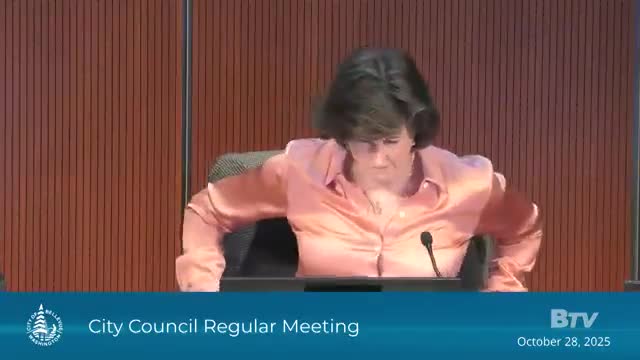Bellevue council directs staff to return with legislation on sewer, permit and wireless fee changes
Get AI-powered insights, summaries, and transcripts
Subscribe
Summary
After study sessions on the mid‑biennium budget and utility and permitting cost studies, the council voted to direct staff to prepare legislation for fee and rate adjustments covering 2026 sewer rates, development services permit fees, school impact fees and wireless leasing fees.
The Bellevue City Council on Oct. 28 directed staff to return with legislation to adopt adjustments to utility (sewer) rates, development services permit fees, school impact fees and transportation wireless fees.
Finance director John Risha described the mid‑biennium update as primarily technical adjustments that do not change levels of service and noted the schedule for public hearing Nov. 12 and tentative adoption on Nov. 18. He told the council the process will “put the dollars in the right places” for appropriation and accounting.
Utilities Director Lucy Liu briefed the council on a narrow adjustment to the city’s previously adopted 2026 sewer rate. She said King County adopted a higher wholesale wastewater treatment increase (7.5% versus the 7% assumed in Bellevue’s adopted budget), and because Bellevue passes wholesale costs through to ratepayers the city would need an additional 0.3 percentage‑point increase — moving the planned 2026 sewer rate from 7.6% to 7.9%. Liu said this adjustment is consistent with city financial policy to pass regional wholesale cost increases through to local customers so local operations and programs are not degraded.
Rebecca Horner and development services staff reviewed a cost‑of‑service update and proposed permit‑fee adjustments. Staff proposed annual updates to hourly review and inspection rates (proposed increases generally in the 7–10% range) driven by personnel, overhead and technology costs. Staff said Bellevue remains broadly competitive regionally but noted neighboring jurisdictions have varied approaches to fee subsidy. Development services also described ongoing process improvements — a permitting expo, a small business program, partnership pilots (including an AI pilot to shorten review cycles) and plans for a public performance dashboard.
Staff reported that two school districts that collect impact fees (Renton and Issaquah) are proposing $0 school impact fees for the coming year based on their capital facility plans and projected enrollment; staff explained that the city simply collects and passes those fees to the districts as the districts’ capital plans dictate.
Transportation staff proposed formalizing existing small‑cell leasing and pool‑reservation fees in the city fee schedule and noted the wireless communication facility annual lease fee is intended as a starting point for site‑specific negotiations per state law.
After questions from council members about rate impacts and support for residents with limited means, Council voted to “direct staff to return with legislation to adopt fee and rate adjustments pertaining to utilities, sewer rates, development services permits, school impact fees, and transportation wireless fees for council consideration at a future meeting.” The motion passed on voice vote. Staff said a public hearing is scheduled for Nov. 12, ahead of tentative adoption on Nov. 18.
